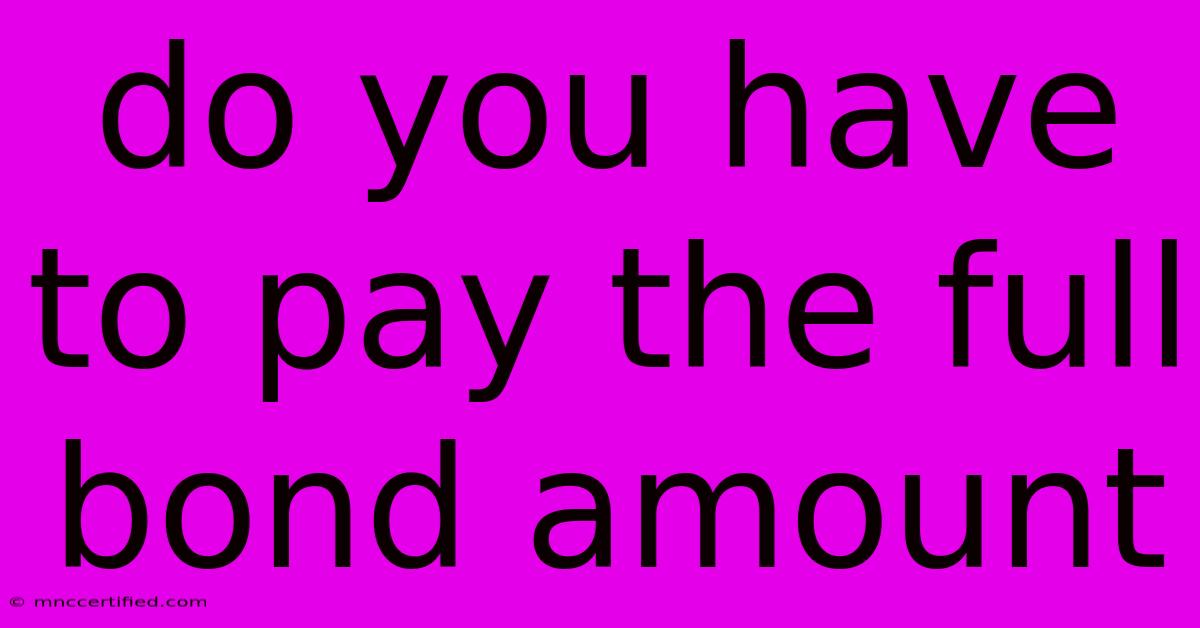Do You Have To Pay The Full Bond Amount

Table of Contents
Do You Have to Pay the Full Bond Amount? Understanding Your Options
Moving into a new home is an exciting time, but it can also be a stressful one. Navigating the world of deposits and bonds is often part of the process, and a common question that arises is: Do you have to pay the full bond amount upfront? The answer is a little more nuanced than a simple yes or no.
What is a Bond?
A bond is a financial guarantee that protects the landlord against any damage or unpaid rent caused by the tenant during their tenancy. It’s usually equal to one or two months' rent and is typically held by the landlord until the end of the tenancy.
Understanding Your Options
While it’s not always required, it’s more common for landlords to ask for the full bond amount upfront. However, you can negotiate this with your landlord, especially if:
- You have a strong rental history. If you can demonstrate a history of responsible tenancy, your landlord might be more amenable to a lower upfront payment.
- You offer a higher deposit. Instead of paying the full bond upfront, you could offer a larger deposit. This could be a compromise that both parties find acceptable.
- You have a guarantor. If you have a guarantor who is willing to be financially responsible for you, your landlord might be willing to accept a lower bond upfront.
Exploring Alternatives to a Full Bond
In certain situations, you might be able to find alternatives to paying the full bond amount:
- Bond Loan: Some financial institutions offer bond loans specifically designed to cover the initial bond payment. These loans are typically short-term and can be repaid in installments.
- Bond Indemnity Insurance: This insurance covers the landlord in case of damage or unpaid rent, making it less risky for them to accept a smaller upfront bond payment.
Negotiating with Your Landlord
When negotiating the bond amount, it’s important to:
- Be polite and respectful.
- Clearly explain your situation. Highlight your positive rental history, any offers of a larger deposit or guarantor, or your interest in alternative options.
- Be prepared to compromise. It’s unlikely you'll get the bond waived entirely, but you may be able to negotiate a lower upfront payment.
Protecting Yourself
Before agreeing to any terms, make sure you:
- Understand the lease agreement. Read the lease thoroughly and ensure you understand all clauses related to the bond, including how it will be returned at the end of your tenancy.
- Document all conversations. Keep a record of any agreements made, including the bond amount and any alternative arrangements agreed upon.
The Bottom Line
While it's common to pay the full bond upfront, it's not always necessary. By understanding your options and negotiating with your landlord, you can find a solution that works for both parties. Remember, a strong rental history, willingness to offer alternatives, and clear communication are crucial to a successful negotiation.

Thank you for visiting our website wich cover about Do You Have To Pay The Full Bond Amount. We hope the information provided has been useful to you. Feel free to contact us if you have any questions or need further assistance. See you next time and dont miss to bookmark.
Featured Posts
-
Outer Banks Season 4 Spinoffs Possible
Nov 08, 2024
-
Malone Westbrook A Rockstar On Defense
Nov 08, 2024
-
Bengals Vs Ravens Score And Live Updates
Nov 08, 2024
-
What Channel Is Ravens Game On Tonight
Nov 08, 2024
-
Is Hotwire Car Rental Insurance Worth It
Nov 08, 2024